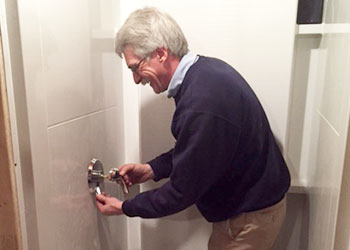Septic system failure is the last thing you want with summer in full swing and temperatures climbing. No one likes the smell of sewage on a 90 degree day.
Let’s talk about what your septic system actually does for you and your home. Whether it’s a sink, washing machine, or even a hot tub, if water is used in your home, it drains into your septic system. Your septic system is responsible for filtering waste out of the water before it is absorbed into the ground. In your septic tank solid waste sinks to the bottom and oils and chemicals float to the top. When septic systems fail it can mean serious health risks for your family and community. Wastewater mixes with groundwater and can cause diseases such as dysentery and hepatitis. A failing septic tank can also cost you thousands of dollars in replacement and repair costs. We want to help you keep your septic system running at peak performance, your family healthy, and your bank account happy.
Signs of septic system trouble
- Pooling wastewater or muddy soil around the septic system.
- Sewage smell.
- Backup when using shower or toilet.
- Bright green patches of grass that grow faster or better than the rest of the lawn.
- Gurgling and bubbling noises from drains.
Tips to avoid a septic flood
Look into options for saving water. The system cannot handle high volumes of water. When there is too much water, it will result in backup and flooding.- Invest in water saver toilets, showers, or washing machines.
- Do large laundry loads over the course of several days to give your septic time to filter.
- Check for leaking toilets or faucets.
How to avoid a clogged septic system
To reduce chances of clogged septic:- Do not flush anything except toilet paper.
- Garbage disposals increase the amount of waste in your tank. Be sure to pump your system annually.
- Paint and household chemicals kill the helpful bacteria that are present in your tank. Avoid dumping even small amounts of these down your drains.

General septic care tips from your Hebron, CT plumber
Have your system inspected and pumped regularly (every 1-3 years). This keeps your system working properly. Regular maintenance lets you get a jump on any problems that might be forming. CT summers are short. Fill the sunny days with relaxation, not plumbing problems!Know where your drain field is located and keep a map of the layout available. Keeping a list of services performed on your system will make it easier to service your septic in the future, saving you time and money.
Can you remember the last time you had your septic tank pumped? Did any of those signs of trouble seem familiar to you? Your first call should always be to your septic service company. Follow up with a visit from your local plumber. Once the tank has been emptied, one of our plumbers here at Rapid Service LLC can diagnose any potential problems with the system, such as cracking or clogs. We recommend the septic friendly drain cleaner, Bio-Clean. We are the local distributor. To schedule a septic system check up, please call 860-228-1036. If you found these tips helpful, follow us on Facebook, Pinterest, or Twitter for more!























